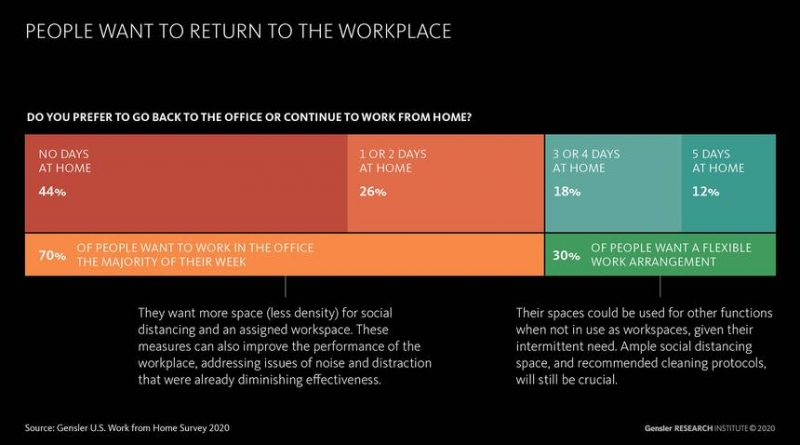Study finds only 12 percent of US workers want to stay home full-time
Energy Disrupter
Gensler interviews thousands, finds most want to go back to the office.
Before the pandemic, only ten percent of American workers worked at home for any length of time, and only a third had the option. We have been writing about how this has changed, most recently noting that many firms are going to allow workers to stay home forever if they like. But a new study by the big architecture firm Gensler’s research institute finds that most workers actually do want to go back.
 © Gensler Research Institute
© Gensler Research InstituteMany want more flexibility; less than half, 44 percent, wanted no days at home. But fully 70 percent wanted to work at the office for the majority of the time, while 30 percent wanted a more flexible arrangement where they could come and go.
 © Gensler Research Institute
© Gensler Research InstituteYounger workers are much more interested in getting back to the office than older ones. This would seem counterintuitive, given that younger workers are so much more comfortable with being online, but the boomers have the homes with the comfy home offices, while the younger workers have tiny apartments, roommates or kids underfoot.
Younger workers report a far more challenging experience working from home than their older peers. They are less likely to feel as if they’ve made a difference or completed the work they needed to do at the end of a typical workday, according to survey responses. Working from home may be having an alienating effect on younger workers, too, as they may feel a gap between their work and their company’s mission.
 © Gensler Research Institute
© Gensler Research InstituteThe main reason that they want to go back is people. “When asked to rank the most important factors for wanting to come into the office, meetings with colleagues, socializing with people, and impromptu face-to-face interaction were the top three answers.”
Despite the mainstream adoption of virtual collaboration technologies, respondents still listed people-focused reasons as the most important reason for coming into the office. By the same token, 55% of respondents said collaborating with others is harder, and 51% said staying up to date on the work of others is more difficult while working from home.
 © Gensler Research Institute
© Gensler Research InstituteWorkers do want change; they want more space, less sharing of workspaces, and more flexibility if they do want to stay home. “Fifty-five percent of people report that in order to feel comfortable returning to the office, a combination of stricter sick policies and changes around office cleaning and space configurations that accommodate physical distancing must be made first.”
People who did not have personal workspaces note that they would actually like to have them.
Does the coronavirus actually prove that offices are indeed necessary?
 © Dotdash pizza party/ Claire Cohen
© Dotdash pizza party/ Claire CohenBeing part of that baby boomer generation and having worked from home for the last fifteen years, this study was surprise to me. But having seen how our new Dotdash team goes through pizza, I can see the attraction. In my post In the future, the office will be like a coffee shop, I tended to agree with designer Dan Boram, who predicted that “people will continue to work from home as much as four days a week and the office will become a destination for the things that can’t be done from home, like socializing, innovating, problem-solving, training and building culture.”
But judging from the Gensler survey, people want more than that out of their office. Of course, it is also possible that the results of the survey are skewed because people are trapped right now, desperate to get out of the house or apartment, and many have entire families in their face when they are trying to work. I wonder if people who want to get back to the office will change their minds after a few months.
Or maybe I am just wrong. Lucy Kellaway, a journalist at the Financial Times who covered office life, writes that in some businesses, the office provides more than just a place to work.
The most important thing — which should make the office less an employer’s white elephant than its biggest bargain — is that it gives work its meaning. Most of what passes for work in offices is pretty meaningless, and the best way to kid yourself it matters is to do it alongside other people intent on doing the same. Even in interesting jobs like journalism, meaning comes largely from physical proximity to your colleagues. After six weeks of writing in her own bedroom, one friend reports: “I’m churning out the same old articles as before, only now I no longer give a crap”.
After writing from home for over a decade, I thought her article was silly, that I am churning out new articles every day and talk to my editor and co-workers constantly. But after reading the Gensler survey I am wondering if I am not looking at the situation from my own Zoom and Skype camera, from my own lovely home office. For others, I can see how that pizza looks mighty tasty.
Read the whole Gensler Research Institute study here.
Gensler interviews thousands, finds most want to go back to the office.
Please enable JavaScript to view the comments.
Original Source: https://www.treehugger.com/interior-design/study-finds-only-12-percent-us-workers-want-stay-home-full-time.html
















